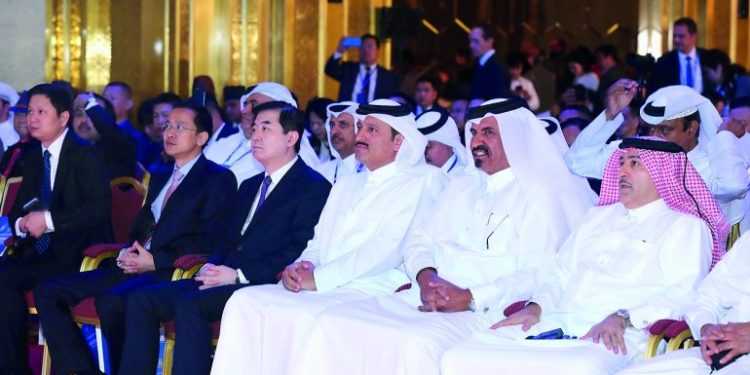Qatar is marking an important milestone in its journey towards achieving sustainable development through the implementation of Qatar National Vision 2030 strategies and programs aimed at reducing dependence on oil and gas and supporting the country’s transition towards a knowledge-based economy, said Sultan Bin Rashid Al Khater, Undersecretary of the Ministry of Commerce and Industry.
Delivering the opening speech at the 6th Global Economic Development Forum, entitled “Global Mindset for Connecting with pearl of the Middle East-Qatar,” Al Khater said Qatar has managed to strengthen its national economy, with the Gross Domestic Product (GDP) rising to $222bn in 2017 compared to $218bn in 2016, an annual growth rate of 1.6 percent at constant price.
Quoting the latest World Bank report, Al Khater said Qatar’s economy will grow by another 2.8 percent in 2018 and by an average 3 percent during the 2019-2020 as the government seeks to further promote foreign investments. Qatar’s foreign trade also grew by 16 percent last year, he said, noting that this growth was driven by an 18 percent increase in Qatari exports, which resulted in a trade surplus of 49.9 percent in 2017.
Elaborating on Qatar’s business and investment environment, he said Qatar offers foreign companies countless incentives and facilities, which has reflected positively on the country’s ranking in several reports by international institutions. Qatar ranks among the most investment-friendly regional economies thanks to its strategic position and its attractive foreign investment policies.
Al Khater said foreign companies seeking to expand their businesses in Qatar can benefit from an advanced and flexible business environment that allows up to 100 percent foreign ownership across all sectors and economic and trade activities.
Qatar is also working on developing its laws and legislation to streamline the issuance of commercial and industrial licenses and speed up the renewal of existing ones.
Qatar’s commitment to spending on long-term and multi-purpose expansion plans has created promising opportunities in a number of projects related to the organization of the 2022 FIFA World Cup, as well as major development projects implemented within the framework of Qatar National Vision 2030.
He said he was looking forward to joint efforts to explore new and innovative cooperation mechanisms that serve the developmental and economic aspirations of all participating countries.
During the forum, Al Khater attended the signing of four memoranda of understanding including an MoU on Cambridge International School between Taleb Group and Hongkong Sino-Austria Group. A second MoU on digital finance was signed between Taleb Group and You Kongpai Blockchain while a third MoU on international trade was signed between Taleb Group and Tongtian International Group. A fourth MoU on trading platform was also signed between Taleb Group and Yangyang Trading Co.
The Qatari side delivered presentations on the advantages that Qatar’s business environment offers, investment opportunities in Qatar Free Zones and preparations for the 2022 FIFA World Cup.
The forum also featured presentations by participating delegations, who touched on several topics including the One Belt, One Road initiative and the opportunities it presents to Qatar and Pakistan. Another touched on efforts to bolster economic development between Qatar and Nepal within the framework of the One Belt, One Road initiative.
The Peninsula
27/11/2018






















































